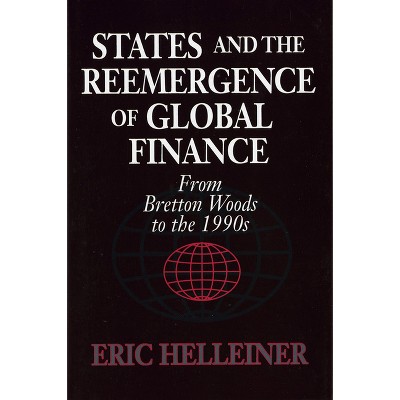Sponsored

Capital, Coercion, and Postcommunist States - by Gerald Easter (Hardcover)
In Stock
Sponsored
About this item
Highlights
- The postcommunist transitions produced two very different types of states.
- About the Author: Gerald M. Easter is Associate Professor of Political Science at Boston College.
- 256 Pages
- Political Science, Political Economy
Description
About the Book
Gerald M. Easter shows how the cumulative result of multiple big and small battles between state coercion and societal capital gave rise to postcommunism's variant political and economic institutions.
Book Synopsis
The postcommunist transitions produced two very different types of states. The "contractual" state is associated with the countries of Eastern Europe, which moved toward democratic regimes, consensual relations with society, and clear boundaries between political power and economic wealth. The "predatory" state is associated with the successors to the USSR, which instead developed authoritarian regimes, coercive relations with society, and poorly defined boundaries between the political and economic realms. In Capital, Coercion, and Postcommunist States, Gerald M. Easter shows how the cumulative result of the many battles between state coercion and societal capital over taxation gave rise to these distinctive transition outcomes. Easter's fiscal sociology of the postcommunist state highlights the interconnected paths that led from the fiscal crisis of the old regime through the revenue bargains of transitional tax regimes to the eventual reconfiguration of state-society relations. His focused comparison of Poland and Russia exemplifies postcommunism's divergent institutional forms. The Polish case shows how conflicts over taxation influenced the emergence of a rule-of-law contractual state, social-market capitalism, and civil society. The Russian case reveals how revenue imperatives reinforced the emergence of a rule-by-law predatory state, concessions-style capitalism, and dependent society.
Review Quotes
"A sagacious narrative based on painstaking analysis of primary sources, the book weaves economic structure, political dynamics, and institutional constraints into a comprehensive picture of the evolving postcommunist state-society...Capital, Coercion, and Postcommunist States presents a remarkably well-researched history of state revenue extraction that builds on a penetrating analysis of the countries' laws, economic statistics, public opinion surveys, press reports, memoirs, and officials' public statements." --Dinissa Duvanova, Canadian-American Slavic Studies
Easter does a masterful job of walking readers through the twists and turns of the never-ending saga with his clear prose, while never losing sight of the larger political story.. the book is a welcome addition to the sparse literature on the evolution of fiscal policy as part of the transition away from state socialism. It deserves a place of honor on the bookshelves of those interested in economic development and political economy.
--Kathryn Hendley "Slavic Review"The way capital and coercion intersect constitutes the core of Easter's explanation for why and how some postcommunist countries emerged with a 'contractual' state and others with a 'predatory' one.... Whether a state follows the path to one type or the other depends heavily on the outcome of battles over taxation, Easter argues in this lucid, well-argued book. Tracing the complex interplay among politicians, bureaucrats, corporate interests, and labor in the struggle to shape the state's capacity to finance itself is no simple task, and Easter does it deftly.
--Robert Legvold "Foreign Affairs"This book offers a rich analysis of the development of postcommunist fiscal systems, offering focused examinations of the Russian and Polish state-building experiences.... There is great elegance in Easter's prose and good humor behind his many insights.... Perhaps the book's greatest strength is in its use of fiscal sociology to shed light upon the pathways by which tax systems developed and the evolving relationships between the state, society, and capital. It is a must-read for students of taxation regardless of regional specialization or methodological stripe.
--Hilary Appel "Russian Review"About the Author
Gerald M. Easter is Associate Professor of Political Science at Boston College. He is the author of Reconstructing the State: Personal Networks and Elite Identity in Soviet Russia.












